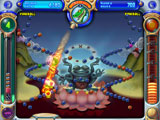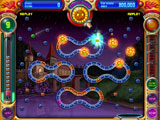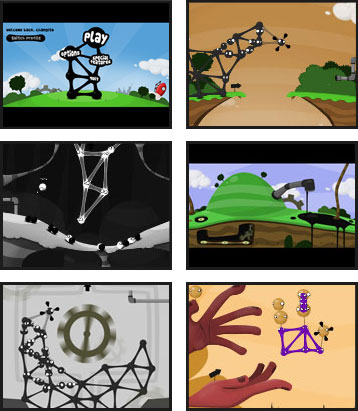Peggle! Funny Word, But Fun Game?
There’s something oddly compelling about PopCap’s latest release, Peggle. The game is basically Pachinko: You fire a ball from the top of the screen and watch it bounce around until it hits the bottom. That’s right, watch. The player is given zero influence and interactivity as soon as the ball leaves the starting cannon. All you can do is join the on-screen mascot in watching it plink from peg to peg. If you’re incredibly skilled–or, more probably, just lucky–the ball falls into a moving bucket and you get it back. That’s it. That’s the game. So why is it so addicting?
The Physics of Peggle
The behavior of individual collisions in Peggle is incredibly simplistic. That isn’t necessarily a bad thing; simplistic also means predictable. The complexity of the physics, from the player’s point of view, comes from predicting the ball’s behavior three, four, five bounces out. At some point you’re basically guessing, especially on levels with moving objects.
It is possible to become a better player at Peggle. The game aptly demonstrates this in the Duel Mode, which has multiple difficulty settings for the computer opponent, and the “Zen Ball” powerup in the single-player mode. I really enjoyed the Zen Ball concept. Essentially, the game will calculate an improvement to your shot. It checks the outcome of small variances in your shot angle, and then corrects it to whichever produces the best result. It highlights the fact that even a small change in angle can produce vastly different results over multiple collisions.
Lack of Interactivity
The lack of interactivity in Peggle will probably be frustrating to hardcore players. As a test, I just played for a minute–I clicked just seven times. Compare this to something like an RTS where you’re going to be clicking thousands of times over the course of a game. Keep in mind, though, that PopCap develops casual games. Their primary audience is 40 year-old women (who are probably talking on the phone while playing anyway).
Despite the lack of direct influence on the game, I’ve found that I do pay attention. In fact, it’s hard to look away. The fun of the game emerges by making all kinds of small predictions. You start to get a sense of when your ball is certainly lost, or when it might go in, even while it’s still bouncing around. It’s fun to make a mental prediction halfway through a shot and see if it comes true or not. As your skill progresses, you eventually get to the point where you’re capable of making that prediction when you first fire the shot. I’d be curious to see how good the PopCap developers are at playing Peggle.
Case Study in Polish
As is typical of PopCap titles, Peggle has a high degree of polish. They do a lot of audio-visual things really well, and that certainly adds to the addictive quality of the game. I’m not sure how fun a flat-color prototype of this game type would be without the production backing it up.
I think Peggle makes for an interesting case study in design. Most interesting, to me, is how the game teaches the player to accept failure. Your ball is going to fall off the screen, no matter what you do. In some sense you beat a level by simply failing more slowly. This contrasts starkly with other games where failure only happens once, harshly and irreversibly. I’m looking forward to seeing how well the market receives the game. I can see it doing well with casual players.
Conclusion
For hardcore physics game fans, Peggle is still probably worth checking out. I found it fun in its own right, but I doubt I’ll be playing it for any length of time (as I have with many physics games). There’s no risk in checking it out; the full game is available as a 60-minute demo.
Download Peggle Game (14.1 MB)
Related Posts:
World of Goo Announced
Kyle Gabler, of Experimental Gameplay Project and Tower of Goo fame, recently left his job at Maxis to start up an indie studio with Ron Carmel. The new company is 2D Boy, and they just announced their first of three games: World of Goo.
More information available at the 2D Boy website.



 (Rate this game! 123 votes, average: 3.84 out of 5)
(Rate this game! 123 votes, average: 3.84 out of 5)


 My name is Matthew Wegner, and this site is dedicated to physics games.
My name is Matthew Wegner, and this site is dedicated to physics games.